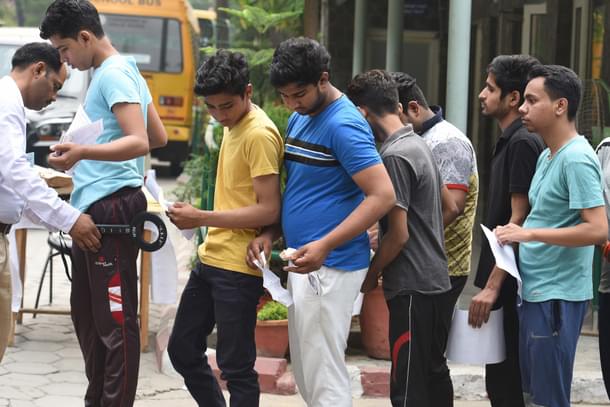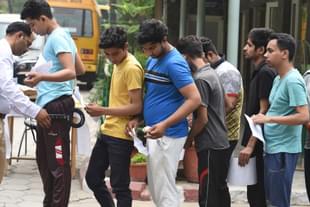Politics
As NEET Is Conducted Peacefully In Tamil Nadu, Time To Look At Controversies Of Past And Identify The Real Culprits
M R Subramani
May 07, 2019, 07:34 PM | Updated 07:34 PM IST
Save & read from anywhere!
Bookmark stories for easy access on any device or the Swarajya app.


For the first time in three years, the National Eligibility-cum-Entrance Test (NEET) for admission into medical colleges across the country went off without any major controversy or protest in Tamil Nadu on 5 May (Sunday).
NEET was first held in 2017 in Tamil Nadu amidst protests and criticism. It even led to the death of a girl, Anitha, who had aspired to be a doctor. In 2018, NEET was embroiled in a controversy after some students complained that they were forced to take tests outside the state. We will come to these issues later.
Given this context, the NEET on 5 May passed off peacefully. More importantly, 1,40,000 students appeared for the tests in Tamil Nadu, up by 20,000 over last year. Another remarkable aspect of students undertaking NEET this year is that at least 19,000 of them have been given special coaching by the state government.
NEET is one topic that evokes a lot of passion and criticism in Tamil Nadu. Critics of Prime Minister Narendra Modi use NEET to discredit him. In the run up to the Lok Sabha elections --- that got over in the state on 18 April ---Opposition parties led by the Dravida Munnetra Kazhagam (DMK) tried to whip up passions around the NEET.
The DMK and its principal alliance partner, Congress, have, in their manifestos, assured to end NEET if they come to power at the centre. In the National Democratic Alliance (NDA), the All India Anna DMK (AIADMK) has assured to plead with the centre to scrap NEET.
NEET has become a hot topic that is often used to criticise Modi and the Bharatiya Janata Party (BJP) government at the centre. But the fact is that the BJP and its leaders have done little in Tamil Nadu to explain that neither Modi nor the party is to be blamed for the NEET fiasco.
The two prime culprits in this issue — Congress and DMK — have got away blaming Modi and the BJP without any challenge. And those who say Congress and DMK are to be blamed, date the developments back to 2009 for things turning bad in Tamil Nadu.
In the Beginning
In 2009, the then DMK government, headed by late M Karunanidhi, decided to implement Samaseer Kalvi or uniform system of school education in Tamil Nadu. Various school educational systems in Tamil Nadu were integrated under this system. It meant that students in State board schools, matriculation schools, Anglo-Indian schools and oriental schools would all be studying a uniform syllabus.
Unfortunately, what happened with the introduction of this new system was that it didn’t raise the standard of education at par with the Central Board of Secondary Education (CBSE) syllabus. Some of the textbooks looked like a propaganda material, which the Supreme Court ordered to be removed. Educational experts said that no professional body prescribed books for this new system, and there was no scope for creative learning.
If this was the problem with the uniform system of education in Tamil Nadu, things got complicated in 2012 when the central government, then headed by Manmohan Singh of the United Progressive Alliance (UPA), decided to implement NEET.
Kabil Sibal, the then Minister for Human Resources Development, introduced NEET for admission to medical colleges so that there would be a single exam for aspirants of medical seats across the country. The objective was also to end nearly 25 different medical entrance examinations that were being conducted in various parts of the country. Yet another reason to introduce the single exam format was to alleviate the problems of parents since many students wrote 7-9 exams, necessitating in huge amounts of money being spent for coaching and travel.
Like many other states Tamil Nadu too had entrance exams for medical seats but the AIADMK government scrapped them in 2006 because the late Jayalalithaa (the then chief minister), felt that such entrance exams put rural students at a disadvantage. So, the medical seats under state quota were filled based on the marks that students obtained in their plus-two exams.
Now NEET was a game changer in that it ensured private medical colleges in any part of the country would fill seats through a common test.
History of Conducting NEET
NEET was first held in 2013 but the Supreme Court struck off the new system as an unconstitutional one in July that same year. However, a five-judge constitutional bench upheld conducting NEET to fill seats in medical colleges.
It is interesting to note that the DMK as an active member of the UPA had not objected to the introduction of NEET in 2013. When the Congress sought to introduce NEET, Jayalalithaa wrote to Singh saying that Tamil Nadu should be exempt from it. She didn’t get the required response. In 2014, after Modi became the Prime Minister, she once again wrote to the centre against NEET. And following a request by some other state governments, states like Tamil Nadu were exempted from NEET in 2016.
And so, it was in only in 2017 that NEET was first held in Tamil Nadu. There were huge protests that year against conducting this exam. Still, the NEET authorities went ahead and held the entrance test.
In an affidavit filed in the Madras High Court, the Department of Health and Family Welfare Secretary said that 1,422 agitations were witnessed in 2017 on account of NEET with political parties staging 933 protests and students staging 317.
The Madras High Court, hearing a petition against NEET, stayed the announcement of the results. But the Supreme Court lifted the stay.
Confounding a Vexed Problem - Enter Nalini Chidambaram
The Tamil Nadu government then approached the centre seeking exemption from NEET through an ordinance. The centre was inclined to consider Tamil Nadu’s plea and approached the concerned ministries.
Even as the centre was set to issue an ordinance, Nalini Chidambaram, wife of senior Congress leader and former union minister P Chidambaram, approached the Supreme Court on behalf of the CBSE students, on implementing NEET.
Nalini Chidambaram contended that NEET would not affect rural students in Tamil Nadu as until 2017 only 250 students in the state had got medical seats from rural areas. She contended that admitting students based on plus-two marks would render injustice to students who had prepared for nearly a year for NEET. She pointed out that nearly 33,000 students had succeeded in NEET of which 30,000 were students studying under the state board. The rest were CBSE students.
Nalini Chidambaram argued that NEET would not affect Tamil Nadu students and if an ordinance was passed to help the state students, it would be unconstitutional.
Following this, Advocate General K K Venugopal told the centre that Nalini Chidambaram had a point and if the centre passed an ordinance, the Supreme Court could strike it down. He said if the centre went ahead with its ordinance, admissions would be needlessly delayed. The centre had no option but to heed to Venugopal’s suggestion.
The Tragedy of Anitha
In fact, the Supreme Court accepted Nalini Chidambaram’s argument and asked the centre to fill up the medical seats based on the NEET results.
One of the petitioners against introduction of NEET was a girl called Anitha, who aspired to become a doctor. She had secured 1,176 marks out of 2,000 in her plus-two exams but got only 86 marks out of 720 in NEET. Losing her case in the Supreme Court, Anitha committed suicide. And the DMK and other political parties, including Congress, took to blaming the centre for it.
However, what came to light later about Anitha adds another dimension to her tragic death. Anitha had got a seat in an engineering college and wanted to join the course. But those who instigated Anitha to fight against NEET had discouraged her from joining the engineering course through her brother, who was a DMK member. Apparently, it transpires that Anitha had been encouraged to approach the Supreme Court by local DMK leaders. The DMK had even sponsored her trip to New Delhi and her stay there.
Finally, when the SC ruling came out in favour of NEET, Anitha, with nowhere to go, committed suicide, resulting in renewed protests against NEET and a backlash against the central government.
The 2018 NEET Controversy
In 2018, NEET raked up controversy again but for a different reason. With 1,20,000 students taking NEET, there were problems in accommodating students to take the test at centres of their choice. Some students gave centres outside Tamil Nadu as their second and third preferences. This resulted in 3,685 students going outside the state to write NEET.
Some television channels chose to play up the issue to indirectly support some private medical colleges. In the end, nearly 40 per cent of students who wrote NEET last year were successful.
Countering False Allegations
Compared to 2017 and 2018, this year has been far more peaceful with not even a murmur of protest. Fortunately for the state board students who took NEET this year, the Tamil Nadu government had revised its syllabus in 2017. Reports in the media said an analysis showed that almost all questions had been covered in the new syllabus.
Unfortunately though, for both those years the blame for the NEET fiasco was on the wrong set of people while those responsible for the mess were actually behind the protests.
M.R. Subramani is Executive Editor, Swarajya. He tweets @mrsubramani




